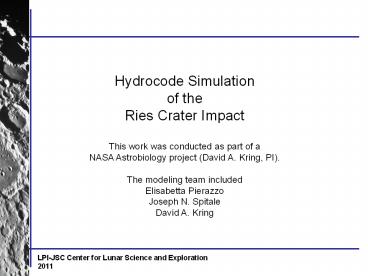LPI-JSC Center for Lunar Science and Exploration - PowerPoint PPT Presentation
Title:
LPI-JSC Center for Lunar Science and Exploration
Description:
Hydrocode Simulation of the Ries Crater Impact This work was conducted as part of a NASA Astrobiology project (David A. Kring, PI). The modeling team included – PowerPoint PPT presentation
Number of Views:94
Avg rating:3.0/5.0
Title: LPI-JSC Center for Lunar Science and Exploration
1
Hydrocode Simulation of the Ries Crater
Impact This work was conducted as part of a NASA
Astrobiology project (David A. Kring, PI). The
modeling team included Elisabetta Pierazzo Joseph
N. Spitale David A. Kring
2
Ries Crater
- Ries Crater
- Complex Crater
- 24-26 km final crater
- diameter
- 12-16 km transient
- crater diameter
- The impact occurred 14
- to 15 Ma
- The larger crater of a
- binary impact with a
- WSW to ENE
- trajectory the other
- crater is called
- Steinheim
Kring (2005)
3
Ries Target Sequence
- Ries Crater
- The target sequence is
- composed of 600 m of
- sedimentary lithologies
- and an underlying
- granitic basement
- A computer hydrocode
- called CTH was used to
- model the impact event.
- The Malmian limestone
- thickens from the north
- to the south. For the
- model, and average
- thickness of 150 m was
- utilized.
Pierazzo, Spitale, Kring (2001)
4
Hydrocode Simulation of Ries Impact
Movie of Impact
Pierazzo, Spitale, Kring (2001)
5
Ries Target Sequence
- Ries Crater
- Four time-steps in the
- hydrocode simulation of
- the impact event
- The projectile is 1.6 km in
- diameter and strikes at
- an angle of 45º at a
- velocity of 15 km/s.
- The trajectory is from
- WSW to ENE (left to
- right), so a plume of
- ejecta is thrown down-
- range (to the right).
Pierazzo, Spitale, Kring (2001)
6
Ries Target Sequence
- Ries Crater
- Schematic view of the
- Ries and Steinheim
- craters after the impact
- event
- Because a sea cross-cut
- the ejecta ENE of the
- crater, a lot of that
- material was eroded.
- The best preserved
- impact ejecta deposits
- occur to the south of
- the crater
7
Reconstruction of Ries Transient Crater
- Transient crater
- Melt (dark gray zone)
- extended to a depth
- slightly greater than 2 km
- and was dominated by
- silicate basement
- lithologies
- The excavation depth
- (medium gray zone)
- approached 2 km
- The transient crater depth
- of disturbed rock (light
- gray zone) approached 5
- km
- Fracturing of the crust
Kring (2005)
8
References
D.A. Kring (2005) Hypervelocity collisions into
continental crust composed of sediments and an
underlying crystalline basement comparing the
Ries (24 km) and Chicxulub (180 km) impact
craters. Chemie der Erde 65, 1-46, invited
review. E. Pierazzo, J.N. Spitale, and D.A.
Kring (2001) Hydrocode modeling of the Ries
impact event. Lunar and Planetary Science XXXII,
Abstract 2106.


























![[May 2018 201-450] New LPI 201-450 Practice Exam Questions| Killtest PowerPoint PPT Presentation](https://s3.amazonaws.com/images.powershow.com/9058587.th0.jpg?_=20180519021)




